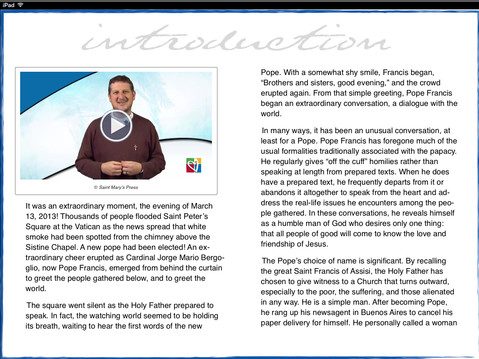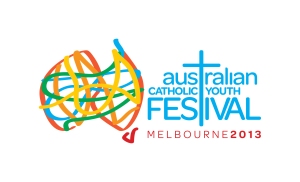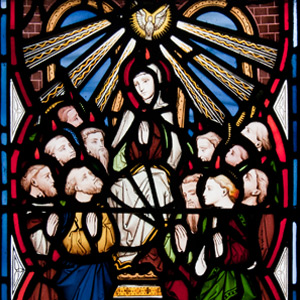This is my talk at the Australian Gathering at World Youth Day in Rio. It’s about vocation: how Jesus is calling each of us to make disciples.
 I’ve just come back from Adelaide and the Australian Catholic Youth Ministry Convention. It was a great weekend!
I’ve just come back from Adelaide and the Australian Catholic Youth Ministry Convention. It was a great weekend!
This workshop looks at Pope Francis’s exhortation Evangelii Gaudium (EG) and ‘marries’ three key concepts from the exhortation with some key research from Dr Christian Smith of Notre Dame University Indiana which he presents in his 2014 book Young Catholic America. This research examines key factors that are most likely to lead to practising young adult Catholics five years after they have finished high school.
Pope Francis’s three concepts are: evangelising communities, the kerygma or proclamation of the Gospel and missionary disciples.
In addition to these three concepts, I also reflect upon Francis’s reading of the signs of the times in EG, and the importance of ensuring that ‘Jesus and Justice’ go together: that a personal faith and a preferential option for the poor are inextricably linked.
I think these key points of EG and the research from Dr Smith have critical insights for the practice of youth ministry.
You can access the audio of the talk from our friends at Xt3 here.
This was the third time I have presented this talk: the previous two occasions were at the Catholic Schools Youth Ministry Australia conference and the Ignite Conference.
A huge vote of thanks to everyone who made ACYMC 2014 possible, especially the ACBC Office for Youth and the local organising committee in Adelaide.
Hi everyone,
my book of reflections on Pope Francis’s messages to young people is now available as an “interactive” edition on ITunes for IPads and Macs. The Ebook has all 52 reflections that the hardcopy edition has, but it also has a further 22 video reflections from me about Pope Francis and his conversation with the youth of the world.
I hope this might be a helpful resource for prayer in youth groups and RE classes, as well as for personal reflection. The words of Pope Francis are well worth reflecting upon.
You can get the interactive edition by clicking the link below:
https://itunes.apple.com/us/book/bring-forth-hope/id807576865?ls=1&mt=11
You can get the hardcopy from St Pauls, Garratt Publishing or St Mary’s Press.
 Hi everyone, it’s nearly two weeks since the inaugural Australian Catholic Youth Festival. It was a great success! Xt3 recorded workshop talks and here’s the link to one of my talks. It’s called the Catholic Thing… but the byline is a little misleading. The talk is really about belonging, vulnerability, shame, courage and other universal experiences, and how the Catholic “thing” speaks to those experiences.
Hi everyone, it’s nearly two weeks since the inaugural Australian Catholic Youth Festival. It was a great success! Xt3 recorded workshop talks and here’s the link to one of my talks. It’s called the Catholic Thing… but the byline is a little misleading. The talk is really about belonging, vulnerability, shame, courage and other universal experiences, and how the Catholic “thing” speaks to those experiences.
You can check out other great talks from the festival here.
Hope you enjoy it.
 You might be interested in my new book, ‘Bring Forth Hope: Pope Francis Speaks to the Youth of the World’.The book consists of 52 quotes from Pope Francis’s words to young people, a short reflection, a prayer and a suggestion for practical action based on the pope’s words.
You might be interested in my new book, ‘Bring Forth Hope: Pope Francis Speaks to the Youth of the World’.The book consists of 52 quotes from Pope Francis’s words to young people, a short reflection, a prayer and a suggestion for practical action based on the pope’s words.
Its been published by Saint Mary’s Press in the USA, while in Australia it will be available at the Australian Catholic Youth Festival, and then online through St Pauls and Garratt Publishing, or from Catholic bookshops.
You can have a look inside the book here
 Last month I spoke at the Colloquium “The Power of the Message: The Kerygma for the New Evangelisation” conducted by the Catholic Renewal and Evangelisation Office (Credo) of the Archdiocese of Sydney. My talk was entitled “Vital Faith Communities: The Optimal Context for the Kerygma”.
Last month I spoke at the Colloquium “The Power of the Message: The Kerygma for the New Evangelisation” conducted by the Catholic Renewal and Evangelisation Office (Credo) of the Archdiocese of Sydney. My talk was entitled “Vital Faith Communities: The Optimal Context for the Kerygma”.
In the talk I argue that vital faith communities are essential to the new evangelisation. New believers need a living faith community if their faith is to be nurtured. Vital faith communities are also needed, however, to provide the witness to Christ that leads people to an encounter with Christ.
This talk is for people who are interested in the renewal of the Church and the role of parishes in evangelisation.
You can listen to the talk here: Vital Faith Communities.
The talk is supplied by Cradio – Australia’s Catholic radio station.
This is my talk at the Australian Gathering at World Youth Day in Rio. It’s about vocation: how Jesus is calling each of us to make disciples.
Here’s my homily for Good Friday this year. I was preaching at Light to the Nations, which is a biennial pilgrimage held by the Disciples of Jesus Community. The homily was recorded and you can listen to it on the CRADIO website here.
I haven’t been posting too much lately – I’m working on my PhD which, along with my responsibilities with the MGL formation program, doesn’t leave too much time for blogging. Seeing Swans will be back though! And I’ll keep posting the occasional talk here too. In the meantime, I’m using Twitter to send out the occasional message into the social media realm. So follow me there for updates on youth ministry, MGL stuff and my occasional thoughts about God, the world and the love in between.
Happy Easter!
 There’s been all sorts of comments about Pope Benedict XVI’s papacy in the media and the social networks since he announced his decision to resign from the papacy. Unsurprisingly, the secular media has focused upon the events that have grabbed global attention like the clerical abuse scandal, Vatileaks and the Regensburg address. And equally unsurprisingly, the assessments of how well Benedict XVI dealt with these and similar issues have varied greatly.
There’s been all sorts of comments about Pope Benedict XVI’s papacy in the media and the social networks since he announced his decision to resign from the papacy. Unsurprisingly, the secular media has focused upon the events that have grabbed global attention like the clerical abuse scandal, Vatileaks and the Regensburg address. And equally unsurprisingly, the assessments of how well Benedict XVI dealt with these and similar issues have varied greatly.
I don’t think it’s unreasonable to weigh Benedict’s handling of these and other difficult matters that arose on his watch, but I also think that it is very easy to transpose a political view of leadership onto the papacy, and thus obscure the true nature of Benedict’s legacy. For while we need the pope to be an effective leader of the global institution that is the Church, the pope’s primary role is to be a spiritual leader. The pope is supposed to lead us to God.
The origins of this mission lie in the very words of Jesus himself, who tells Peter that when he has turned (literally ‘converted’) he is to strengthen his fellow disciples (Luke 22:32). This means that to understand Benedict’s legacy we need to look as much to his encyclicals and letters, to his homilies and weekly addresses, and to his apostolic visits to different countries as to his organizational management of the Church. And by that measure, BXVI seriously stacks up.
Again and again and again Benedict simply and eloquently pointed us to the heart of the Christian faith: to the encounter with Jesus Christ. From his first encyclical:
Being Christian is not the result of an ethical choice or a lofty idea, but the encounter with an event, a person, which gives life a new horizon and a decisive direction. (Deus Caritas Est #1)
And this encounter with Christ is at the one and the same time an encounter with the God who is love. From one of Benedict’s Q and A sessions with a group of priests:
Christianity is not a highly complicated collection of so many dogmas that it is impossible for anyone to know them all; it is not something exclusively for academicians who can study these things, but it is something simple: God exists and God is close in Jesus Christ.
And again,
Christianity is not a new philosophy or new morality. We are Christians only if we encounter Christ… Only in this personal relationship with Christ, only in this encounter with the Risen One do we really become Christians… Therefore, let us pray to the Lord to enlighten us, so that, in our world, he will grant us the encounter with his presence, and thus give us a lively faith, an open heart, and great charity for all, capable of renewing the world.
And finally,
Many people perceive Christianity as something institutional — rather than as an encounter with Christ — which explains why they don’t see it as a source of joy.
Benedict XVI is one of the great theologians of the twentieth century, a truly great intellect capable of critically engaging with both sacred and secular currents of thought. Without denying or dismissing his theological contribution for a moment, I think that Benedict XVI’s greatest legacy is that he has been a pastor and a missionary, a spiritual father. And there is something about the simplicity with which this formidable theologian went about this that reminded us again and again that Christianity is Christ: that everything else that makes up the Catholic faith flows from our encounter with the Risen Lord. And Benedict did not simply speak about these things, but truly embodied them. He was and is a wonderful witness to the joy that this encounter with Christ brings.
Thank you Holy Father.
 This is the podcast of a pub talk I gave at “Truth on Tap”, in the Broken Bay Diocese earlier in the year. You can listen to it at the XT3 website here: You can also download the podcast from the XT3 site.
This is the podcast of a pub talk I gave at “Truth on Tap”, in the Broken Bay Diocese earlier in the year. You can listen to it at the XT3 website here: You can also download the podcast from the XT3 site.
The basic thrust of the talk is this: that faith is the result of an encounter with Christ the Beautiful One. Christians are fundamentally lovers of Beauty. It examines the difference between a theoretical or purely conceptual encounter with Christ, and the actual encounter with Christ. Christ is beautiful, even and especially as the Crucified. These topics are explored through the story of one young man’s encounter with Christ.
The talk draws upon the theological project of Hans Urs von Balthasar.